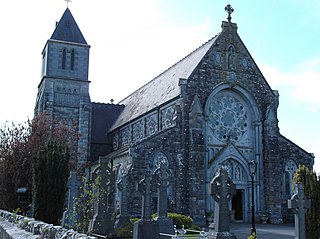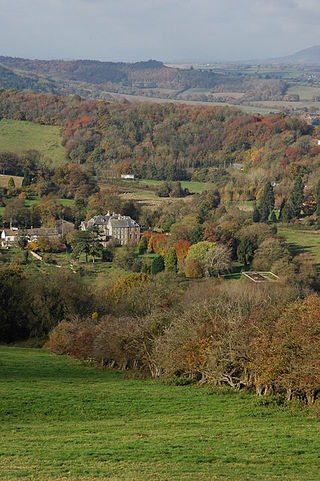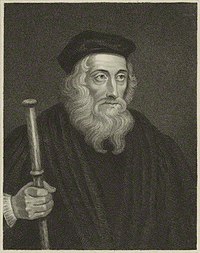
John Waltham was a priest and high-ranking government official in England in the 14th century. He held a number of ecclesiastical and civic positions during the reigns of King Edward III and Richard II, eventually rising to become Lord High Treasurer, Lord Privy Seal of England and Bishop of Salisbury. He is buried in Westminster Abbey, London.
The Master of the Rolls in Ireland was a senior judicial office in the Irish Chancery under English and British rule, and was equivalent to the Master of the Rolls in the English Chancery. Originally called the Keeper of the Rolls, he was responsible for the safekeeping of the Chancery records such as close rolls and patent rolls. The office was created by letters patent in 1333, the first holder of the office being Edmund de Grimsby. As the Irish bureaucracy expanded, the duties of the Master of the Rolls came to be performed by subordinates and the position became a sinecure which was awarded to political allies of the Dublin Castle administration. In the nineteenth century, it became a senior judicial appointment, ranking second within the Court of Chancery behind the Lord Chancellor of Ireland. The post was abolished by the Courts of Justice Act 1924, passed by the Irish Free State established in 1922.

Thomas Cantock, Quantock or Cantok was an English-born cleric and judge in medieval Ireland, who held the offices of Bishop of Emly and Lord Chancellor of Ireland.
Robert Wikeford or de Wikeford was an English-born diplomat, lawyer and judge, who became Lord Chancellor of Ireland and Archbishop of Dublin.

The Court of Exchequer (Ireland), or the Irish Exchequer of Pleas, was one of the senior courts of common law in Ireland. It was the mirror image of the equivalent court in England. The Court of Exchequer was one of the four royal courts of justice which gave their name to the building in Dublin in which they were located, which is still called the Four Courts, and is in use as a courthouse.
Nicholas de Balscote was an English-born official and judge in fourteenth-century Ireland. He attained high judicial office, but his career was damaged by a quarrel with King Edward II.
Robert Sutton was an Irish judge and Crown official. During a career which lasted almost 60 years he served the English Crown in a variety of offices, notably as Deputy to the Lord Chancellor of Ireland, Chief Baron of the Irish Exchequer, Master of the Rolls in Ireland, and Deputy Treasurer of Ireland. A warrant dated 1423 praised him for his "long and laudable" service to the Crown.

Thomas de Everdon was an English-born cleric and judge, who was a trusted Crown official in Ireland for several decades.

Thomas de Cottingham was an English-born cleric and judge who held the office of Master of the Rolls in Ireland.
Robert de Emeldon, or Embleton was an English-born Crown official and judge who spent much of his career in Ireland. He held several important public offices, including Attorney-General for Ireland, Lord High Treasurer of Ireland and Chief Baron of the Irish Exchequer. He was a turbulent and violent man, who was guilty of at least one homicide, was imprisoned for a number of serious crimes including rape and manslaughter, and had a reputation for corruption: but he was a royal favourite of King Edward III and was thus able to survive his temporary disgrace in the early 1350s.
Sir John de Shriggeley, whose family name is also spelt Shirggeley and Shryggeley was an Irish statesman and judge who held several important judicial offices, including Chief Justice of the Irish Common Pleas. Although he committed two murders, he was a valued servant of the English Crown.

John de Troye was a Welsh-born Crown official and judge in fourteenth century Ireland, who held the offices of Chancellor of the Exchequer of Ireland and Lord Treasurer of Ireland. He was also a leading ecclesiastic, whose most senior clerical office was Chancellor of St. Patrick's Cathedral, Dublin. He was a notable pluralist.
William de Whithurst was an English Crown official, who held office as a judge in Ireland.

Thomas Bache was an Anglo-Italian cleric and judge who held high office in Ireland in the later fourteenth and early fifteenth centuries. He served one term as Lord High Treasurer of Ireland and three terms as Chief Baron of the Irish Exchequer.
Robert Dyke, Dyck or Dyche was an English-born cleric and judge who held high office in fifteenth-century Ireland. He was appointed to the offices of Archdeacon of Dublin, Chancellor of the Exchequer of Ireland, Lord High Treasurer of Ireland, and Master of the Rolls in Ireland, as well as holding several Church benefices.
John de Kirkby or de Kirkeby was an English scholar, cleric and Crown official who held high judicial office in Ireland, and ended his career as Archdeacon of Carlisle.
The Clerk of the Crown and Hanaper was a civil servant within the Irish Chancery in the Dublin Castle administration. His duties corresponded to the offices of Clerk of the Crown and Clerk of the Hanaper in the English Chancery. Latterly, the office's most important functions were to issue writs of election to the Westminster Parliament, both for the Commons and for Irish representative peers in the Lords.

Thomas de Dent, Thomas Dyvelyn, Thomas Denton, or Thomas of Dublin was an English-born cleric and judge who held high office in Ireland during the reign of King Edward III, and was praised as a diligent and hard-working Crown official, who damaged his health through overwork.

Robert de Shardlow, or de Shardelaw (1200-c.1260) was a senior Crown official, diplomat and judge who had a distinguished career in both England and Ireland in the reign of King Henry III of England. He also became a substantial landowner in both countries.
Roger Hawkenshaw or Hakenshawe was an Irish judge and Privy Councillor.
 Ruins of St Dunstan-in-the-East, 2010
Ruins of St Dunstan-in-the-East, 2010









